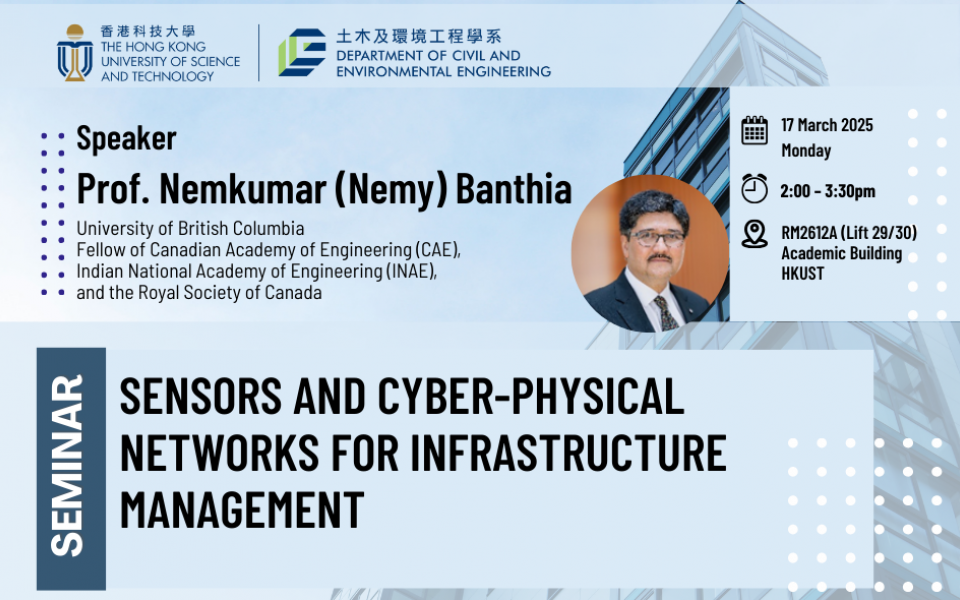Civil Engineering Departmental Seminar - Sensors and Cyber-Physical Networks for Infrastructure Management
Supporting the below United Nations Sustainable Development Goals:支持以下聯合國可持續發展目標:支持以下联合国可持续发展目标:
Sensors and Cyber-Physical Networks for Infrastructure Management
Structural resilience carbon-neutrality are critical challenges facing the society. In this context, it is now universally agreed that in addition to using materials with low embedded carbon, improved methods of monitoring and management are needed for minimized life-cycle carbon and disaster resilience. It is further agreed that monitoring our critical infrastructure using Sensors and Cyber-Physical Networks is an essential element needed for low carbon infrastructure management and resilience.
A broader expose on integrating sensors in our infrastructure will be presented. We’ll focus on three types of sensors:
a) Medium-recognition sensors based on various concepts including photoelectric and dielectric principles for scour monitoring. These sensors can detect mudslides, foundation scour and structural collapses resulting from geotechnical failures.
b) Cement-based piezo-resistive sensors with carbon nano-tubes for strain, stress and chemical monitoring. These sensors can detect stresses, chemical profiles and corrosion initiation.
c) Embedded sensors for monitoring cracking and strains development in internally cured concrete pavements. These sensors can detect onset of cracking and curling in pavements and decks.
Some date from currently monitored structures will be reviewed in light of the objectives cited above. Finally, the presentation will embark on discussing ways of using sensor data, AI, and digital twins to achieve carbon-neutral and resilient infrastructure.
Nemkumar (Nemy) Banthia is a University Killam Professor, Distinguished University Scholar and Canada Research Chair at The University of British Columbia. His primary area of research is in Sustainable Concrete Infrastructure and Use of Sensors and AI for Infrastructure Management. A mentor to many, Dr. Banthia has graduated over 75 doctoral and post-doctoral students. He holds 9 patents, has published over 500 refereed papers, and has edited 30 volumes. He serves on the Editorial Boards of nine international journals and is the Editor-in-Chief of the J. of Cement and Concrete Composites— a journal with a 2023 Impact Factor of 10.8. His awards include the Wason Medal of American Concrete Institute, Solutions Through Research Award of the BC Innovation Council, Wolfson Merit Award of the Royal Society of the UK, Killam Research Prize from the Killam Foundation, Horst Leipholz Medal of the Canadian Society for Civil Engineering, Mufti Medal of Excellence of the International Society for Health Monitoring of Infrastructure, and Global Citizenship Award of alumni-UBC. In 2020, IIT-Delhi recognized him with a Distinguished Alumni Award, and March 2022, Dr. Banthia received the Jacob Biely Faculty Research Prize which is regarded as UBC’s premier award for research across all disciplines. Having received the Dean’s Medal of Distinction from the Faculty of Applied Science, UBC, in January 2023, UBC appointed Dr. Banthia as the University Killam Professor, which is the highest honor UBC can confer on a member of its faculty. Dr. Banthia is a fellow of the American Concrete Institute, Canadian Society for Civil Engineering, Indian Concrete Institute, Canadian Academy of Engineering (CAE), Indian National Academy of Engineering (INAE), and the Royal Society of Canada.
